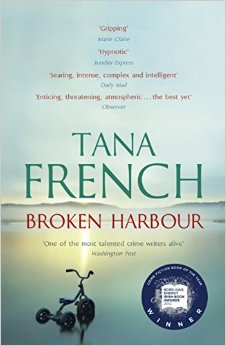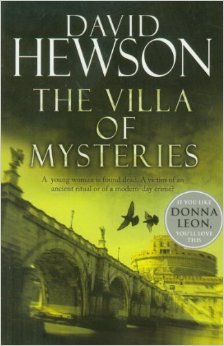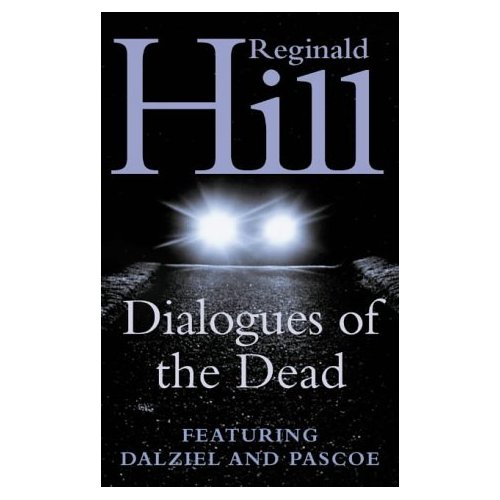
Sometimes there is no safe place.
So begins the blurb for Tana French’s fourth novel, ‘Broken Harbour’, in which it gradually becomes clear that a family’s house and their relationship with it has played a significant role in their murders.
What’s it about?
A family of four have been found slain in their own home. Mike Kennedy, the murder squad detective in charge, is suitably cynical after ten years in the job and is soon ready to call the deaths an inside job, one way or another. However, his new trainee, Richie, refuses to believe such a perfect seeming family could have played any role in their own deaths and posits an outsider, a madman fixated on the Spains. As the evidence mounts, whose theory will win out? And by the time this case is unravelled, what else will unravel with it?
What’s it like?
Extremely engaging from the outset. Narrated in the first person by Kennedy, readers are immediately enmeshed in office politics and learning about this detective’s house style.
“Long before I say Word One to a witness, or a suspect, he needs to know that Mick Kennedy is in the house and that I’ve got this case by the balls.”
“Long before I say Word One to a witness, or a suspect, he needs to know that Mick Kennedy is in the house and that I’ve got this case by the balls.” If you’re not put off by this macho bravado, you’ll soon be intrigued by the case and the relationship developing between the two murder squad detectives. Kennedy doesn’t have a partner; he prefers to work with trainees as they’re less trouble and will do what they’re told, but Richie insists on questioning him and could be the partner he didn’t even know he wanted. This angle is nicely handled, (you feel yourself really wanting their partnership to work,) but there’s still plenty of focus on the case itself, which is a strange one.
Why are there holes bashed in the walls of the Spain’s perfect house? Why are there multiple baby monitors pointed at the holes? And why were the family no longer receiving visitors? There’s a nice mixture of CSI style investigation and good old-fashioned police interview technique as the case unfolds almost in real-time. We’re treated to a post-mortem, ‘floaters’ being assigned duties and night-time stakeouts – then everything changes and suddenly it’s all about the psychology. If this character did it – why? There’s still a focus on the evidence but there’s more focus on unpicking the Spain’s history and trying to chart their last few months in detail.
Will I like it?
The pace seems to slow down about half-way through and the book itself weighs in at 533 pages, so if you’re not sufficiently invested in the characters then you could find your motivation to see the crime solved fading – especially if you’ve reached a plausible conclusion and are just waiting to see it realised. However, the criminal investigation is embedded in a deeply atmospheric novel and French makes effective use of humour throughout, so it’s well worth reading to the end, even if you think you know who and – crucially – why dunnit.
“I love CSI: our techs don’t need to work miracles these days, because all civilians think they can.”
I particularly enjoyed the very entertaining conversations between Kennedy and Dr Cooper, a pathologist who dislikes the lead detective sufficiently to pepper him with putdowns throughout their conversations. For instance: “Far too many variables are involved to permit an intelligent guess and, regardless of what you might do in my place, I refuse to make an unintelligent one.” Ouch.
I also appreciated the evocative descriptive touches deployed throughout: there was “Silence, so packed with stubborn that you could feel it elbowing you.” and “A couple of med students who should have known better had brought their eyebags and stubble outside for a cigarette.” Of course, one man’s rubbish is another man’s treasure and vice versa… French could lose some readers through a lack of concision.
Final thoughts
‘Broken Harbour’ is an intriguing and atmospheric crime novel, but it’s also much more. It’s a moving account of the effects of the recession on the unemployed; it’s a frightening look at how minds can become untethered from reality; and it’s an exploration of what it means to uphold the law and to dispense justice.
The whole fits together beautifully and I will certainly be looking for Tana French’s previous novels, all of which are narrated by members of the same fictional Dublin Murder Squad. (There’s an interesting interview with French about this particular novel and its links to its predecessors here.) The only question is where to begin, at the beginning (‘In the Woods’) or with the most compelling plot outline (‘The Likeness’)? Decisions, decisions.


